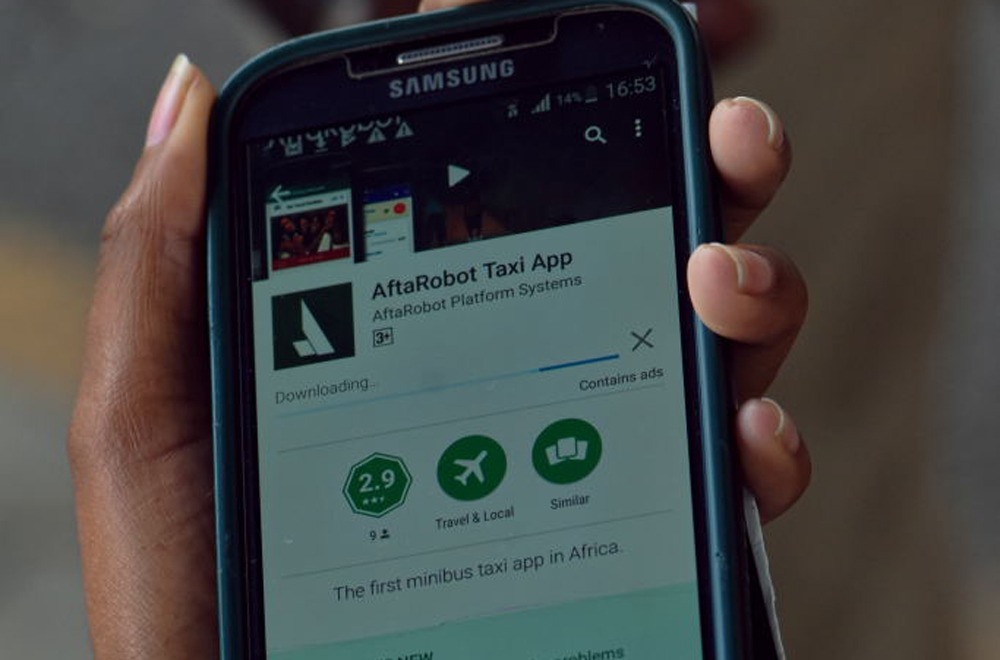
In February this year, 38-year-old techpreneur, Obakeng Matlhoko, finally saw the fruits of five years of labour.
Matlhoko, who is from Galeshewe, Kimberley had the opportunity to see his app AftaRobot, launch, to much fanfare, at two of Johannesburg’s busy taxi ranks – Bree and South Gate, Johannesburg, during peak afternoon traffic.
AftaRobot is a transport management platform for taxi drivers and commuters that Matlhoko co-founded together with Sipho Kobue, Nathi Tshabalala and Lawrence Matjeni.
Their solution gives commuters using vehicles from the Johannesburg Southern Suburbs Taxi Association (JSSTA) information about when they can expect to depart from or arrive at a particular place and pre-order a taxi for collection at a designated spot.
The app also enables queue marshals to better plan and allocate taxis according to demand and drivers to locate passengers quicker by tracking users’ locations which the drivers can see on their smartphones.
Answering an urgent question
Matlhoko has extensive experience in the transport industry. He has a transport and logistics qualification from the University of Johannesburg and also participated in the ICT Mobile Business Building Programme hosted by the SA-Finland Knowledge Partnership (SAFIPA), which was sponsored by the World Bank and the Department of Science and Technology, among others.
After completing his studies Matlhoko worked as an intern for a transport consulting firm, where he had the opportunity to engage with a number of taxi associations as well as gain experience in transport policy and planning.
According to Matlhoko, AftaRobot is the culmination of his, and his co-founders’ life experiences and wanting to answer the question of why the industry, which transports up to 70% of the public transport market, remained informal and without investment.
“Minibus taxis transport billions of people annually, get[s] no subsidy (or priority lanes even though they are a high occupancy vehicle) like most other “formal” public transport services, yet has managed to survive from our country’s dark days all the way to now. There was a compelling story in that, that we could not pass up,” Matlhoko says.
An industry ripe for disruption
Matlhoko’s app is just one of a number of recent innovations that have launched that are bringing tech to what is still a largely informal industry.
Among the newest is the Gauteng on the Move app launched this month by the Gauteng MEC for Roads and Transport Ismail Vadi. The app provides commuters with real-time public transit information, timetables and fares for Gauteng-based public transport operators, including Gautrain, Metrobus, A re Yeng, Rea Vaya, Metrorail, Gautrain Bus Services, Johannesburg City Sightseeing Bus, Tshwane Bus Services as well as minibus taxi services.
While technology has infiltrated almost every sector, Matlhoko says there continues to be some reluctance from commuters.
“People have a lot of fear towards change and we understand this and for us it’s just a matter of constantly being around and talking to people and eventually things will change.”
While taxis are the most popular mode of transport in the country, Matlhoko says it won’t be the transport of choice for long if the industry doesn’t improve.
“While most people cannot afford the other fancier modes of transportation, yes they will use your service, but that is not a good space to be in because the moment a better alternative comes through what’s going to happen? They [the customers] are going to move,” he says.
This is where he says the app can be of use to taxi drivers and the industry itself.
“We’re saying make your service better, try to engage your customer more, get people to understand what this is and be that service of reliability.”

A winding road
While Matlhoko says he was pleased with the rollout of the app, he admits that the journey to the launch has been bittersweet. Particularly challenging, he says, was trying to convince corporates to buy into the app and overcoming the negative perceptions that many people have about the taxi industry.
“A lot of the times when you’re in boardrooms pitching to corporates, you’re dealing with people that have had dealings with mini buses from [their own driving] perspective, so a vehicle has cut in front of them for example. So they all have this notion of what taxis are, but they don’t realise that taxis drive like that because they have commuters waiting everywhere.”
He says their first big break was winning the Gauteng Innovation Competition in 2013 and thereafter receiving incubation from The Innovation Hub via mLab Southern Africa.
Other partners also came on board, including global tech company Qualcomm Wireless Reach, which provides wireless connectivity to startups that leverage mobile technology for social impact. At the launch of the app, Qualcomm showed their support by providing a free WiFi network that allowed commuters to download and test the app.
In addition to support from the private sector, AftaRobot also receives support from organisations like the JSSTA which helped with the implementation and launch of the app in the south of Johannesburg.
Future plans
Now that the app has launched, Matlhoko says he is looking forward to the future. In the next two years, he and his team want to implement AftaRobot in over 10 000 vehicles and for 4 000 owners and 50 000 commuters to have access to it.
“We have undergone a process to train and empower minibus taxi drivers, owners, queue marshals and minibus taxi association staff to use mobile devices to gather route activity and performance, in order to enable commuters to receive route information, estimated time of vehicle arrival and trip time more efficiently than ever before,” says Matlhoko.




